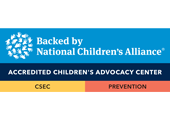Child Abuse
Sexual Exploitation of Children
Human trafficking is widely defined as “a crime that involves exploiting a person for labor, services, or commercial sex.” In Massachusetts the trafficking of children is known as Commercial Sexual Exploitation of Children (CSEC). Our multidisciplinary team recognizes that CSEC occurs when a person under the age of 18 is offered/offers to engage, or does engage, in sexual conduct with another person for a fee or in exchange for food, shelter, clothing, education, or something of value to them. Child sexual abuse material (nude or sexual photos of someone under 18) is also considered a form of trafficking.
This video was made possible by grant funding from the Massachusetts Children’s Alliance.
Risk Factors
CSEC uses a child’s age or other vulnerabilities and any child under the age of 18 is at risk, but those with the following risk factors are especially vulnerable:
Has access to the internet
Anyone who owns or has access to internet accessible devices (including video game systems, tablets, PCs or mobile devices) is at risk for being manipulated into online or in-person exploitation.
Desires independence
As children become older and want more independence, they may take extraordinary, and sometimes dangerous, risk to “fit in” or to remain “in love.”
In foster care or residential placement
Children who are in the custody or care of child protective services already carry several risk factors, and often a history of abuse or neglect. Perpetrators manipulate those with lower safety nets to exploit due to these vulnerabilities.
Unstable home, school life, or housing
Children who struggle with stability in their home lives or at school often seek security and comfort. Some people exploit this in children and seek to develop a trusting relationship which is stronger than the one within their family. This trust is then used to exploit the child.
Family challenges with legal status
When families are vulnerable to threats of being reported to authorities due to their legal status, exploiters may take advantage of the children in these families.
May identify as LGBTQIA+
Lack of family support, rejection from peers and support networks, or barriers in their living area isolates LGBTQIA+ youth. Nearly 40% of homeless youth in America identify as LGBTQIA+. As such, survival base exploitation impacts LGBTQIA+ youth at an incredibly higher rate.
History of child sexual abuse
Nearly 70% of survivors of CSEC and human trafficking identify they had been victims of disclosed or previously undisclosed sexual abuse as a child. The impacts on self-worth, value and at times survival tactics increases the vulnerability of individuals to further exploitation.
Signs of Exploitation
Unfortunately, there is no clear and discernable sign that a child is being exploited. At times, there may be no signs at all. However here are some red flags to pay attention to.
- Regularly runs away from home, or goes missing from care, sometimes out of the area they live
- Stops engaging in social activities, hobbies, or friend groups
- Unexplained absences from school
- Lies about age and identity or has secret online profiles and cell phones
- Has profiles to dating sites used for adults
- Has material items inconsistent with the child’s access to money or socioeconomic status
- Dependency or misuse of substances
- Has large amounts of cash, pre-paid cards, or hotel keys
If you see these signs with your child, or a child you know, click here to Get Help, or contact us today to discuss.







